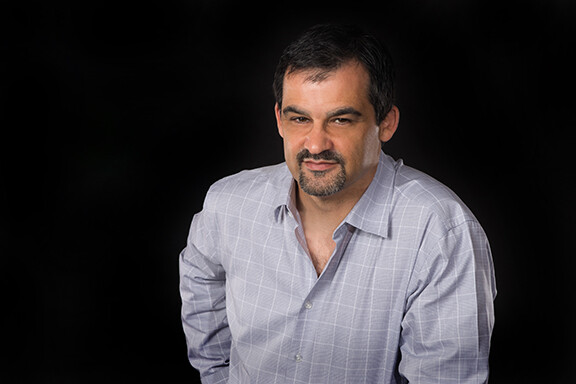
Five students from the Johnny Carson School of Theatre and Film are preparing to stage a first-ever English translation of “La Capeadora.”
The students and Ian Borden, associate professor of theatre, are preparing the production for the Association for Hispanic Classical Theatre Conference in El Paso, Texas, in April. A sneak-preview of the production will be offered at 6 p.m. April 9 in the Lab Theatre on the third floor of the Temple Building. The performance is free and open to the public.
“La Capeadora,” written by Luis Quiñones de Benavente, is a short, comical one-acts, performed on their own or in conjunction with longer works. The script dates from the 16th and 17th centuries in Spain.
It portrays several lively rounds in an epic battle of the sexes — conflict that touches on issues that intriguingly connect 21st century America to 17th century Spain, including questions of access to financial independence for women, the social value of gender equality and the cultural role of marriage.
Borden has been working with a translating group from the Association for Hispanic Classical Theatre for around 10 years and this is their eighth translation of the Spanish shorts. Other scholars working on the project to translate “La Capeadora” include Ben Gunter, Theater with a Mission; Kerry Wilks, Wichita State University; Dave Pasto, Oklahoma City University; and Susan Paun de Garcia, Denison University.
The five Carson School students Emmalee Allen, Tatianna Hizar, Grant Koch, Hilda Rey and Mari Smal are working on the project as part of a Undergraduate Creative Activities and Research Experience project.
It’s the first time the translating scholars have used actors instead of scholars in a performance of their translation and used them to help polish the translation.
“Scripts aren’t really meant to be read; they’re meant to be played,” Borden said. “And that’s where it really becomes a functioning piece of theatre.”
While at the conference, the students will also attend classes and attend plays at the Chamizal Siglo de Oro Theatre Festival, an international festival of Golden Age Spanish theatre, which refers to theatre in Spain roughly between 1590 and 1681.
“I am looking forward to experiencing all of the historic Spanish theatre that will be there,” Hizar said. “I have no experience in viewing or participating in Spanish theatre before this opportunity in ‘La capeadora,’ so I’m excited to get my world view broadened a bit more and see what this kind of theatre is about.”
Last summer, Allen was among 16 students from the Carson School who studied internationally at Shakespeare’s Globe Theatre in London, England. She sees comparisons between Shakespeare and Spanish theatre.
“It is written in and we’re doing this in iambic pentameter,” Allen said. “I feel like a lot of the training I got in London is going to really help me in this show to hit my beats and allow other people to understand what I’m saying.”
Hizar also traveled to England last summer and said the approach will be similar.
“The Globe practices really stressed sharing your character with the audience and fostering a relationship with them,” she said. “The Globe definitely helped me develop a comfort with interacting with the audience, and I’m looking forward to bringing that to this play.”
Borden is looking forward to seeing the translation performed.
“This has been in our heads for a year, so to finally have it come to life is great,” he said. “You can see how it actually plays to audiences and how often it comes forward centuries in time and still makes audiences giggle and laugh. I love that jump of time that always happens. You get it with Shakespeare. You get it with this as well.”
He hopes the students gain an appreciation for Spanish theatre.
“I hope they start to realize how interesting the Spanish Golden Age was, in terms of its dramatic contribution,” Borden said. “It is probably the most vibrant and challenging of all the Renaissance stages in Europe, but it is the least studied by most Western scholars. Part of our project is to bring those plays to a contemporary audience, both in terms of going to the theatre and for scholarship.”
Allen plans to video blog during conference. The videos will be available via her YouTube channel.







